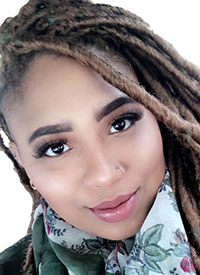“We need more diverse perspectives in computer science just like we need them in the boardroom. If we have more diversity in computer science, we will see more diversity and equity in our solutions.”
— Brittany Johnson, an assistant professor of computer science

Brittany Johnson, an assistant professor of computer science, is researching ways to eliminate or reduce bias in software.
A Mason Engineering professor is on a mission to improve software development so that computer programs are fair to everyone.
“We develop technology using real-world data, but that data can have biases that affect the output of the software,” says Brittany Johnson, an assistant professor in the Department of Computer Science. It happens in software developed for healthcare, banking, and retail, she says.
“For example, in healthcare, we use algorithms that help decide on treatment and prioritize patients. Unfortunately, these have been shown to be biased against certain groups, such as African Americans,” she says.
Johnson is determined to change that. Her research evaluates tools and practices that support analyzing software and its components for bias. “It’s important we understand what’s being done in practice and provide solutions for building and using fair, equitable software,” she says.
David Rosenblum, chair of the Department of Computer Science, says, “Businesses, healthcare providers, law enforcement, and government agencies now rely heavily on algorithmic tools to make critical decisions affecting people’s lives.
“Unfortunately, because of the way these tools are programmed, they often embody significant biases that result in unsound and even detrimental decisions. Brittany’s research promises to understand and attack the sources of bias in these tools to ensure fair and sound decision-making,” he says.
Before joining Mason, Johnson was a postdoctoral research fellow at the University of Massachusetts Amherst, where she developed a new testing technique, called Causal Testing, that supports developers in understanding the cause of unexpected behavior in their software.
In addition to her passion for research, Johnson enjoys mentoring students both inside and outside the classroom. Before the pandemic, she taught and mentored middle and high school students at workshops and camps.
She doesn’t want young people to be intimidated by computer science. “Computer science is so much more than writing code and memorizing algorithms,” she says.
“I want to help attract a more diverse perspective to computer science,” Johnson says. “We need more diverse perspectives in computer science just like we need them in the boardroom. If we have more diversity in computer science, we will see more diversity and equity in our solutions.”
